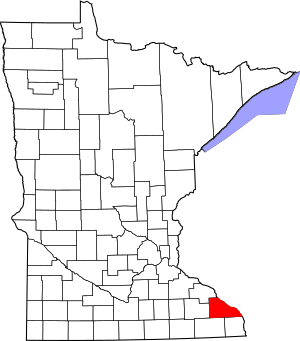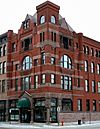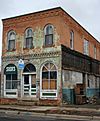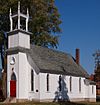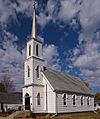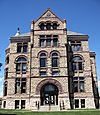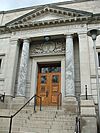National Register of Historic Places listings in Winona County, Minnesota facts for kids
This is a list of cool and important places in Winona County, Minnesota, that are on the National Register of Historic Places. Think of it like a special list of buildings, parks, and other spots that are super old or have a really interesting story. They are protected because they teach us a lot about history!
There are 47 places in Winona County on this list. We'll also look at a few places that used to be on the list but aren't anymore.
Amazing Historic Places in Winona County
| Name on the Register | Image | Date listed | Location | City or town | Description | |
|---|---|---|---|---|---|---|
| 1 | Anger's Block |
(#78001571) |
116-120 Walnut Street 44°03′07″N 91°38′01″W / 44.051935°N 91.633492°W |
Winona | This old building from 1872 is one of the oldest shops still standing in downtown Winona. It's part of a bigger historic area too! | |
| 2 | Willard Bunnell House |
(#73000998) |
Homer and Matilde Streets 44°01′20″N 91°33′35″W / 44.022321°N 91.559628°W |
Homer | Built in 1849, this was the first permanent house south of Saint Paul. It has a cool Gothic Revival architecture style. It was home to pioneer brothers Willard and Lafayette Bunnell. Today, it's a museum you can visit! | |
| 3 | Central Grade School |
(#12000071) |
317 Market Street 44°02′53″N 91°38′05″W / 44.047951°N 91.634734°W |
Winona | This elementary school was built in 1930. It was one of five new schools in Winona. They were built to make schools better, with separate grades, kindergartens, gyms, and art rooms. They also had better safety features. | |
| 4 | Chicago, Milwaukee & St. Paul Railway Station |
(#13000327) |
65 East Mark Street 44°02′39″N 91°38′24″W / 44.0443°N 91.6401°W |
Winona | This train station from 1888 shows how important trains were in Minnesota. Winona was a big train hub. It's still used today as the Winona Amtrak station. | |
| 5 | Choate Department Store |
(#76001079) |
51 East 3rd Street 44°03′07″N 91°38′11″W / 44.052034°N 91.636463°W |
Winona | This commercial building from 1881 belonged to Hannibal Choate. He was a very important merchant in southeast Minnesota. It's also part of the Winona Commercial Historic District. | |
| 6 | Church of Saint Stanislaus-Catholic |
(#84000251) |
624 East 4th Street 44°02′49″N 91°37′20″W / 44.046999°N 91.622271°W |
Winona | This beautiful church was built in 1895. It has a Romanesque Revival style. It was built by Minnesota's largest Polish American community. It's one of Winona's most famous buildings. | |
| 7 | Church of the Holy Trinity-Catholic |
(#84001721) |
83 Main Street 44°05′52″N 91°49′08″W / 44.097841°N 91.818911°W |
Rollingstone | This church was built in 1869 and made bigger in 1893. It has a Gothic Revival architecture style. It was very important for the religious and social life of the Luxembourg American community there. | |
| 8 | East Second Street Commercial Historic District |
(#90002198) |
66–78 Center, 54–78 East 2nd, and 67–71 Lafayette Streets 44°03′12″N 91°38′07″W / 44.053334°N 91.635206°W |
Winona | This area is one of the few parts left of an old river town's business district. Most of its 14 buildings were built in the late 1860s. It shows how fast Winona grew as a center for lumber and grain. | |
| 9 | Benjamin Ellsworth House |
(#84001718) |
U.S. Highway 14 43°58′43″N 91°57′23″W / 43.97862°N 91.956358°W |
Utica | This house from 1873 has an Italianate style. It belonged to Benjamin Ellsworth, who founded the town of Utica. | |
| 10 | Dr. J. W. S. Gallagher House |
(#84000245) |
451 West Broadway 44°03′08″N 91°38′56″W / 44.052268°N 91.648998°W |
Winona | This house is a great example of the Prairie School style. It was designed by the famous architects Purcell & Elmslie. | |
| 11 | Grain and Lumber Exchange Building |
(#77000774) |
51 East 4th Street 44°03′04″N 91°38′13″W / 44.051083°N 91.63696°W |
Winona | This office building was built in 1900. It's a perfect example of Renaissance Revival style. | |
| 12 | William Hemmelberg House |
(#86002916) |
County Highways 26 and 37 44°05′20″N 91°59′30″W / 44.088802°N 91.991588°W |
Elba vicinity | This stone farmhouse was built around 1858 and made bigger around 1870. It's one of the few remaining buildings from the early pioneers in the Whitewater Valley. | |
| 13 | Abner F. Hodgins House |
(#84000248) |
275 Harriet Street 44°03′08″N 91°38′46″W / 44.052084°N 91.646243°W |
Winona | This amazing house from 1890 is in the Queen Anne style. It belonged to Abner F. Hodgins, a leader in the lumber industry. Lumber was very important to Winona's early success. | |
| 14 | Huff-Lamberton House |
(#76001080) |
207 Huff Street 44°03′11″N 91°38′39″W / 44.053109°N 91.644292°W |
Winona | This is one of Minnesota's oldest and best-kept Italian Villa style houses. It was built in 1857. A cool Moorish Revival porch was added in 1873. | |
| 15 | Jefferson School |
(#12000072) |
1268 West 5th Street 44°03′16″N 91°40′16″W / 44.054471°N 91.671146°W |
Winona | This elementary school was built in 1938. It was another one of the five new schools built by Winona Public Schools. It helped bring in new ways of teaching. It also got money from the Public Works Administration and has a cool Art Moderne style. | |
| 16 | Kirch/Latch Building |
(#75001036) |
114-122 East 2nd Street 44°03′10″N 91°38′02″W / 44.052899°N 91.633814°W |
Winona | This commercial building from around 1868 has a mix of Gothic Revival and Italianate architecture styles. It was home to a large company that sold farm products. They used Winona's river and train connections. | |
| 17 | Laird, Norton Company Building |
(#14000392) |
125 W. 5th St. 44°03′03″N 91°38′24″W / 44.05086°N 91.639909°W |
Winona | This building was the main office for a big lumber company from 1918 to 1958. The company started in the 1850s. They cut logs from northern forests and sent them by train to places in southern Minnesota and South Dakota. | |
| 18 | Madison School |
(#12000073) |
515 West Wabasha Street 44°03′06″N 91°39′05″W / 44.051687°N 91.651313°W |
Winona | This elementary school was built in 1932. It was another one of the five new schools in Winona. It helped bring in new ways of teaching, like separate grades, kindergartens, and better safety. | |
| 19 | Nicholas Marnach House |
(#78003406) |
Off County Highway 26 in Whitewater Wildlife Management Area 44°07′11″N 92°01′57″W / 44.119824°N 92.032384°W |
Elba vicinity | This stone house from around 1857 is covered in stucco. It's the oldest example of a special building style used by German immigrants in Southeast Minnesota. | |
| 20 | Merchants National Bank |
(#74001045) |
102 East 3rd Street 44°03′08″N 91°38′06″W / 44.05212°N 91.634907°W |
Winona | This bank was built in 1912 and is a great example of the Prairie School style. It was designed by famous architects Purcell, Feick & Elmslie. It greatly influenced American architecture in the early 1900s. It's also part of the Winona Commercial Historic District. | |
| 21 | Model School Building and College Hall of the Winona Normal School |
(#13000884) |
416 Washington & 151 W. Sanborn Sts. 44°02′52″N 91°38′34″W / 44.047877°N 91.642875°W |
Winona | These buildings from 1915 and 1924 were part of Minnesota's first teacher training school. It was active from 1860 to 1971. Now, they are called Phelps Hall and Somsen Hall at Winona State University. | |
| 22 | Pickwick Mill |
(#70000314) |
24813 County Road 7 43°58′49″N 91°29′48″W / 43.980382°N 91.496718°W |
Pickwick | This is one of the oldest water-powered gristmills in southeast Minnesota. It was built in 1854. Today, it's a historic place you can visit. | |
| 23 | Saint Charles City Bakery |
(#84001723) |
501 Whitewater Avenue 43°58′22″N 92°03′53″W / 43.972853°N 92.064681°W |
St. Charles | This commercial building from 1876 is the last part of St. Charles' original business area. The rest was destroyed by a fire in 1891. | |
| 24 | Schlitz Hotel |
(#82003087) |
129 West 3rd Street 44°03′10″N 91°38′21″W / 44.052848°N 91.639225°W |
Winona | This hotel and café from 1892 was started by the Joseph Schlitz Brewing Company. It's a well-preserved example of how breweries used to open other businesses. It's also part of the Winona Commercial Historic District. | |
| 25 | Sugar Loaf |
(#90001164) |
Southwest of U.S. Highway 61 and Minnesota State Highway 43 44°01′42″N 91°37′36″W / 44.028377°N 91.626585°W |
Winona | This is a 500-foot-high river bluff with a unique peak. It was created by quarrying in the 1800s. It has been a famous landmark for travelers since the 1870s. | |
| 26 | Sugar Loaf Brewery |
(#78001572) |
Lake Boulevard and Sugar Loaf Road 44°01′44″N 91°37′27″W / 44.028866°N 91.624213°W |
Winona | This brewery has storage caves dug into Sugar Loaf. It was owned by Peter Bub and others. They made beer here from 1872 to 1969. | |
| 27 | Trinity Episcopal Church |
(#84001726) |
805 Saint Charles Avenue 43°58′11″N 92°03′58″W / 43.969787°N 92.0661°W |
St. Charles | This church from 1874 is important because its inside and outside are very well preserved. It's built in the Carpenter Gothic style. | |
| 28 | Trinity Episcopal Church |
(#84001727) |
8110 West Main Street 44°01′39″N 91°45′56″W / 44.027578°N 91.765632°W |
Stockton | This church from 1859 is known for its well-preserved Carpenter Gothic style. It was important to a community started by American settlers, but later many German immigrants moved there. | |
| 29 | Washington-Kosciusko School |
(#12000074) |
365 Mankato Avenue 44°02′33″N 91°37′10″W / 44.042587°N 91.619499°W |
Winona | This elementary school was built in 1934. It was another one of the five new schools in Winona. It helped bring in new ways of teaching. It also got money from the Public Works Administration, a big program from the New Deal. | |
| 30 | J.R. Watkins Medical Company Complex |
(#84003940) |
150 Liberty Street 44°02′58″N 91°37′41″W / 44.049473°N 91.628176°W |
Winona | This was the main office for a very large direct sales company in the early 1900s. It has seven buildings built between 1900 and 1914. One building from 1911 was designed by the famous architect George W. Maher. | |
| 31 | Paul Watkins House |
(#84000255) |
175 East Wabasha Street 44°02′49″N 91°38′08″W / 44.047026°N 91.635449°W |
Winona | This Jacobethan style house was built from 1924 to 1927. It was designed by architect Ralph Adams Cram. It belonged to Paul Watkins, who helped make the J.R. Watkins Company famous for its door-to-door sales. | |
| 32 | Whitewater Avenue Commercial Historic District |
(#84001736) |
900–1012 Whitewater Avenue 43°58′08″N 92°03′54″W / 43.968826°N 92.065119°W |
St. Charles | This street has a row of seven commercial buildings that look very similar. They were built between 1890 and 1901. | |
| 33 | Whitewater State Park CCC/WPA/Rustic Style Historic Resources |
(#89001661) |
Off Minnesota State Highway 74 south of Elba 44°03′15″N 92°02′45″W / 44.054061°N 92.045777°W |
Elba vicinity | This park has 29 historic buildings and features built from 1934 to 1941. They were made by federal work programs like the New Deal. They show different styles of National Park Service rustic design. | |
| 34 | Winona and St. Peter Engine House |
(#84001730) |
75 Gould Street 44°03′26″N 91°40′07″W / 44.057263°N 91.668546°W |
Winona | This engine house from around 1890 is the only building left from a big train repair complex. It was a major employer and part of the train network that helped Winona's economy grow. | |
| 35 | Winona and St. Peter Railroad Freight House |
(#84001733) |
Front and Center Streets 44°03′14″N 91°38′06″W / 44.05382°N 91.63504°W |
Winona | This is Winona's last remaining freight warehouse, built in 1882–83. It represents the Winona and St. Peter Railroad, which helped develop Minnesota and the Dakota area. Winona was a big center for making and shipping goods. | |
| 36 | Winona City Hall |
(#99000806) |
207 Lafayette Street 44°03′03″N 91°38′10″W / 44.050848°N 91.636114°W |
Winona | This amazing city hall was built in 1939 in the Classical Moderne style. It got money from the Public Works Administration. It's an example of the huge federal programs from the New Deal that helped people during tough times. | |
| 37 | Winona Commercial Historic District |
(#98001220) |
3rd Street between Franklin and Johnson Streets 44°03′07″N 91°38′07″W / 44.051965°N 91.635173°W |
Winona | This six-block downtown area shows how rich Winona became. It was a river and train town that grew into the main business center of southeast Minnesota in the late 1800s. It has 65 historic buildings built between 1868 and 1920. | |
| 38 | Winona County Courthouse |
(#70000313) |
171 West 3rd Street 44°03′11″N 91°38′26″W / 44.052922°N 91.640439°W |
Winona | This county courthouse from 1889 has a Romanesque Revival style. It shows how successful Winona was during its time as a riverboat and logging town. | |
| 39 | Winona Free Public Library |
(#77000775) |
151 West 5th Street 44°03′04″N 91°38′26″W / 44.051088°N 91.640656°W |
Winona | This public library from 1899 has a Neoclassical style. It's important for its architecture and culture. It was specially designed to hold public art along with library services. | |
| 40 | Winona High School and Winona Junior High School |
(#03001350) |
166 and 218 West Broadway 44°03′03″N 91°38′31″W / 44.050882°N 91.64192°W |
Winona | These two schools were finished in 1917 and 1926. They show how the local community worked to bring in new teaching ideas with updated buildings. A big auditorium built in 1928 hosted many local and national shows. | |
| 41 | Winona Hotel |
(#83000947) |
157 West 3rd Street 44°03′11″N 91°38′23″W / 44.05297°N 91.63972°W |
Winona | This hotel from 1889 has a Romanesque Revival style. It was built for visitors during Winona's best days as a place for great theater shows. It's also part of the Winona Commercial Historic District. | |
| 42 | Winona Masonic Temple |
(#98000152) |
255 Main Street 44°03′03″N 91°38′22″W / 44.050697°N 91.639307°W |
Winona | This Masonic Temple was built from 1908 to 1909. It was the main building for a group that was important to Winona's community and social life. It's also known for its large collection of old theater backdrops and stage equipment. | |
| 43 | Winona Savings Bank Building |
(#77000776) |
204 Main Street 44°03′05″N 91°38′17″W / 44.051422°N 91.638181°W |
Winona | This bank was built from 1914 to 1916. It's the largest and best-preserved building in Minnesota with the Egyptian Revival style from the early 1900s. It's one of architect George W. Maher's best works in Minnesota. |
Places No Longer on the List
| Name on the Register | Image | Date listed | Date removed | Location | City or town | Summary | |
|---|---|---|---|---|---|---|---|
| 1 | Bridge No. L1409 |
(#90000978) |
|
Hillsdale Township Road 62 over Garvin Brook 44°03′22″N 91°44′52″W / 44.05599°N 91.747757°W |
Winona vicinity | This stone arch bridge from 1895 was called the state's "most impressive" rural bridge. It was destroyed in the 2007 Midwest flooding. | |
| 2 | E. L. King House (Rockledge) |
(#82003086) |
|
U.S. Route 61 |
Winona vicinity | This Prairie School style house from 1911 was torn down in 1988. | |
| 3 | James P. Pearson Steamboat/Julius C. Wilkie Steamboat |
(#75001035) |
|
Foot of Main St. at Mississippi River (Levee Park) |
Winona | This steamboat was destroyed by a fire in 1981. | |
| 4 | Stockton Mill |
(#75001034) |
|
8th St. |
Stockton | This mill from 1890 was destroyed by a fire in 1988. |
Images for kids
Black History Month on Kiddle
Renowned African-American Artists:
 | Selma Burke |
 | Pauline Powell Burns |
 | Frederick J. Brown |
 | Robert Blackburn |

All content from Kiddle encyclopedia articles (including the article images and facts) can be freely used under Attribution-ShareAlike license, unless stated otherwise. Cite this article:
National Register of Historic Places listings in Winona County, Minnesota Facts for Kids. Kiddle Encyclopedia.

